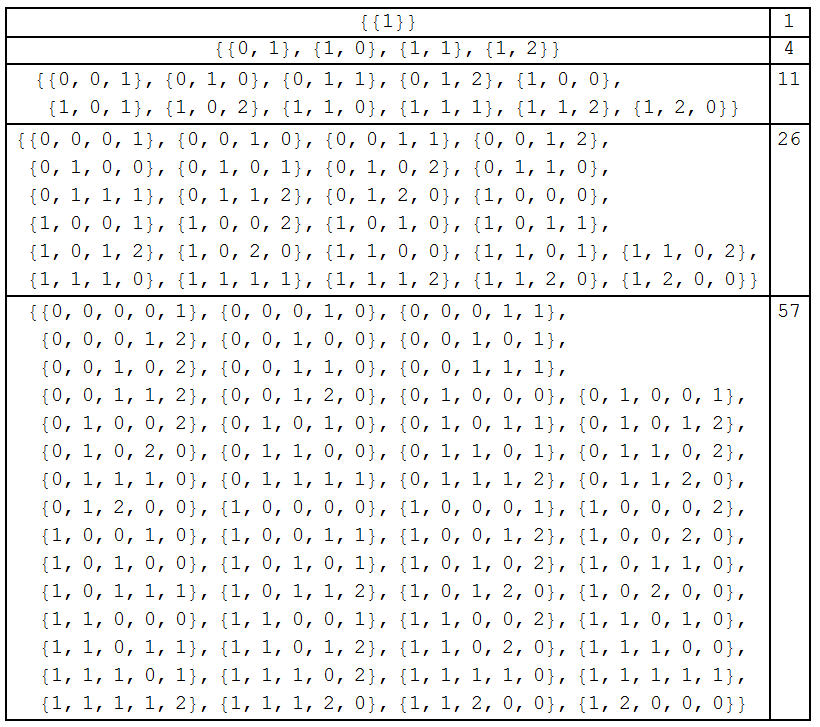I want a function myfun that generates list like this
myfun[1]
{{1}}
myfun[2]
{{0, 1}, {1, 0}, {1, 1}, {1, 2}}
myfun[3]
{{0, 0, 1}, {0, 1, 0}, {0, 1, 1}, {0, 1, 2}, {1, 0, 0}, {1, 0, 1}, {1, 0, 2}, {1, 1, 0}, {1, 1, 1}, {1, 1, 2}, {1, 2, 0}}
myfun[4]
{{0, 0, 0, 1}, {0, 0, 1, 0}, {0, 0, 1, 1}, {0, 0, 1, 2}, {0, 1, 0, 0}, {0, 1, 0, 1}, {0, 1, 0, 2}, {0, 1, 1, 0}, {0, 1, 1, 1}, {0, 1, 1, 2}, {0, 1, 2, 0}, {1, 0, 0, 0}, {1, 0, 0, 1}, {1, 0, 0, 2}, {1, 0, 1, 0}, {1, 0, 1, 1}, {1, 0, 1, 2}, {1, 0, 2, 0}, {1, 1, 0, 0}, {1, 1, 0, 1}, {1, 1, 0, 2}, {1, 1, 1, 0}, {1, 1, 1, 1}, {1, 1, 1, 2}, {1, 1, 2, 0}, {1, 2, 0, 0}}
myfun[5]
{{0, 0, 0, 0, 1}, {0, 0, 0, 1, 0}, {0, 0, 0, 1, 1}, {0, 0, 0, 1, 2}, {0, 0, 1, 0, 0}, {0, 0, 1, 0, 1}, {0, 0, 1, 0, 2}, {0, 0, 1, 1, 0}, {0, 0, 1, 1, 1}, {0, 0, 1, 1, 2}, {0, 0, 1, 2, 0}, {0, 1, 0, 0, 0}, {0, 1, 0, 0, 1}, {0, 1, 0, 0, 2}, {0, 1, 0, 1, 0}, {0, 1, 0, 1, 1}, {0, 1, 0, 1, 2}, {0, 1, 0, 2, 0}, {0, 1, 1, 0, 0}, {0, 1, 1, 0, 1}, {0, 1, 1, 0, 2}, {0, 1, 1, 1, 0}, {0, 1, 1, 1, 1}, {0, 1, 1, 1, 2}, {0, 1, 1, 2, 0}, {0, 1, 2, 0, 0}, {1, 0, 0, 0, 0}, {1, 0, 0, 0, 1}, {1, 0, 0, 0, 2}, {1, 0, 0, 1, 0}, {1, 0, 0, 1, 1}, {1, 0, 0, 1, 2}, {1, 0, 0, 2, 0}, {1, 0, 1, 0, 0}, {1, 0, 1, 0, 1}, {1, 0, 1, 0, 2}, {1, 0, 1, 1, 0}, {1, 0, 1, 1, 1}, {1, 0, 1, 1, 2}, {1, 0, 1, 2, 0}, {1, 0, 2, 0, 0}, {1, 1, 0, 0, 0}, {1, 1, 0, 0, 1}, {1, 1, 0, 0, 2}, {1, 1, 0, 1, 0}, {1, 1, 0, 1, 1}, {1, 1, 0, 1, 2}, {1, 1, 0, 2, 0}, {1, 1, 1, 0, 0}, {1, 1, 1, 0, 1}, {1, 1, 1, 0, 2}, {1, 1, 1, 1, 0}, {1, 1, 1, 1, 1}, {1, 1, 1, 1, 2}, {1, 1, 1, 2, 0}, {1, 1, 2, 0, 0}, {1, 2, 0, 0, 0}}
Feature of the list:
Each element is of length K.
Only 0,1,2 are allowed.
Must have at least a 1.
Can have 0s,1s only, without a 2.
If 2 exists, must be after at least a 1 AND after any 2, there must be 0 (or 0s or nothing).
The length of the list is determined by
nLength[K_Integer] := LinearRecurrence[{4, -5, 2}, {1, 4, 11}, K][[K]];
So the length of the first 8 lists are {1,4,11,26,57,120,247,502} and so on.
Some pieces I have got:
mytest[K_] := Drop[Flatten[{Tuples[{0, 1}, K], ReplaceList[ConstantArray[0, K], {a___, x_, b___, y_, c___} :> {a, 1, b, 2, c}]}, 1], 1];
It only works for the first two lists. And there are pieces missing (obviously). How can I create this effectively for large K, like 20,30? We will get length of list equal to 2097130 and 2147483616.


Kconsisting of the numbers 0, 1, and 2, such that only zeros can follow a 2, and each list must contain at least one 1; is this correct? $\endgroup$